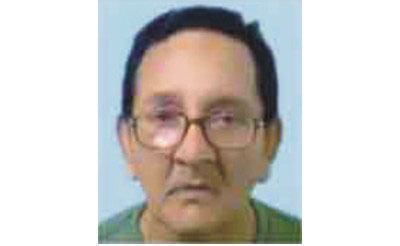Kazi: The intrepid freedom fighter

Kazi Kamaluddin Ahmed
Kazi Kamaluddin Ahmed Bir Bikram, popularly known as Kazi, was laid to rest on Monday, January 16, in his ancestral home in Kaliakor in a tree-lined clearing of what must have been a forest once, bathed in the crimson glow of winter afternoonin the womb of the mother he fought so valiantly to liberate four decades back. The Intrepid Kazi, the incarnation of dare and gusto, fell silentas bugles played the last post and the birds sang a lullaby.
Returning from the front after the liberation of Bangladesh in 1971, we heard of stories of the raids by a crack platoon of young daredevils in the heart of Dhaka city, thought by the Pak army as their bastion. This small band of freedom fighters not only took on the enemy, armed to the teeth with no-holds barred to silence us with death and torture, but also drove terror in their hearts. Kazi was one of them.
While some of us who grew up in Dhakathe pristine pasture of our endearment and romancewanted to fight the enemy in the city they had viled with blood and tears, we were left to content ourselves in the distant western fronts. With a sense of jealousy we admired Kazi's group who did our proxy fights, executed with courage, speed and ingenuity we could not have accomplished. They upheld our honour.
Occasionally, over the years, I would sit down with Kazi to hear his exploits in the War which he narrated in a matter of fact way, typical of him. I knew how much guts it took to drive a car through the citycheck-posts everywhere with order to shoot at willwith cocked stenguns and bumping-off one after another of the Pak army's secured posts. At the end they could not keep their cover and Jewel, Bodi and others paid with their lives. Kazi was lucky and his bravado paid off. On a monsoon night, cordoned by the Pak army in what was their safe hideouta house in Dhanmondi, Kazi did the impossible. He kicked one of the Pak army jawans off balance as they stood guard with guns pointed at them and made his way out through a hail of bullets.
He had another close shave with death in November 1975 when freedom fighters were being picked up at random and executed. From a makeshift cell where he was confined in Rampura TV station, Kazi broke open and swam across the marshy swathe, to be received by another set of executors waiting on the other side; but his sports credential came to his rescuean army personnel recognised him as Kazi Bhai, the basketball coach and got him off just in time before bullets were fired. Instead of heading home, Kazi left for Germany and returned after a long sojourn. His heart was in Bangladesh.
Over years, I became Tawfiq Bhai to him.
Kazi had joined the 2nd War Course as an army cadet but left the service with a few others on his return to the liberated Bangladesh. Since then, unlike others, his life never took roots. As if after a job well done, he was on permanent leave. He floated on the fringes of life, a near bohemian existence with not much to look for. He had an infectious gusto, a refreshing encounter with life that was a fleeting experience. He enjoyed every bit of it. I was never surprised to see Kazi knocking at my residence at Gulshan morning, afternoon or at the wee hours of night. He was always alive and kicking. Kazi Bhai to my wife, and chacha to my two daughters, was from another world. His engagement with life was confined to his wife, son Siyam and daughter Mashfia. He loved them in his unique way and once in a while, regretted not having done much for them. Kazi was always keen about my welfare.
In 2008 when the intelligence guys were intimidating me to give false testimony against Sheikh Hasina, Kazi dropped by at my place. He told me that he had been to the headquarters of DGFI looking for those responsible for persecuting me. He wanted to have few wordsI knew what it all meant. Kazi believed in summary actionman to man. I was relieved that he had not had the encounter he was looking for. I told him to back off imagining a 60+ year old landing a few punches on a serving general.
Kazi was perennially short of cash but not on generosity. When he was fighting for life after surgery a few months ago, my youngest daughter Mridula got married. Kazi left an envelope with $200 inside. I called to rebuke him, given he was broke with his medical expenses, only to be rebuffed. He said that he had saved some from his treatment and it was the least he could to give his blessing on such an occasion!
Before finally checking into the hospital, Kazi dropped in at my office, He knew his days were numbered but still held a detached, yet a generous view, of life. With a wry face he left. He was at the end of a tumultuous journey during which he gave so much away and got so little.

 For all latest news, follow The Daily Star's Google News channel.
For all latest news, follow The Daily Star's Google News channel. 



Comments